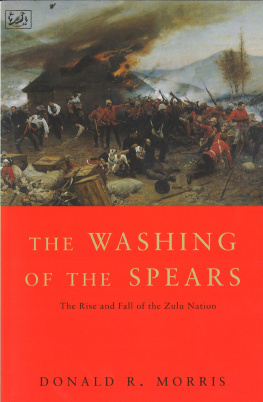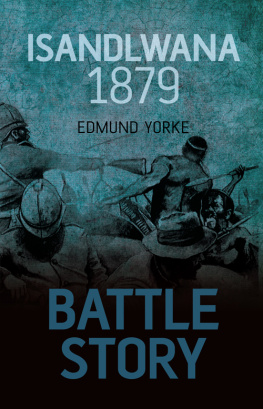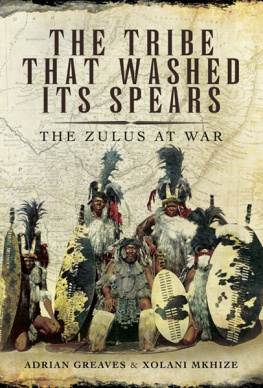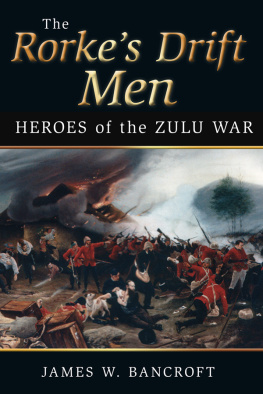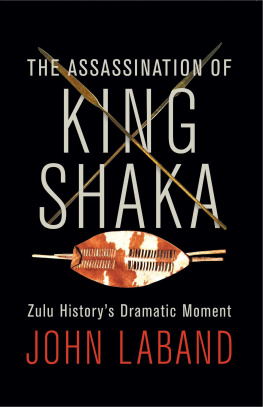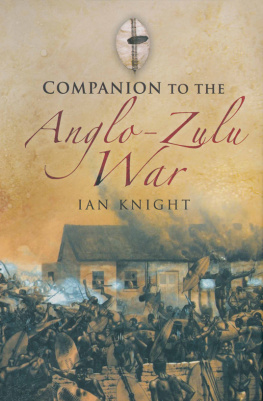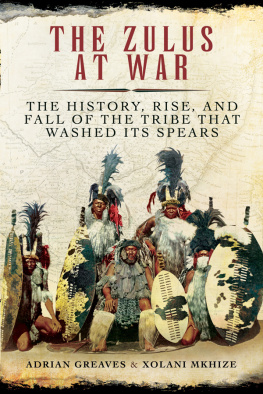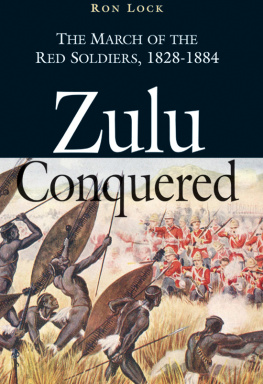THEWASHINGOFTHESPEARS
DonaldR. Morris
First published in Great Britain by JonathanCape Ltd 1966
Copyright by Donald R. Morris 1965
ISBN 0 7474 0194 2
CONTENTS
FOREWORD
PREFACE
Part One
Prologue
The Bantu
The Rise of the Zulu Nation
Port Natal
Dingane
Mpande
Part Two
Confederation
The Coming of the War
Preparations
Invasion
Isandhlwana
The Defence of Rorkes Drift
The Flanking Columns
Aftermath
The Left Flank Column
The Second Invasion
The Prince Imperial
Ulundi
The Captains and the Kings Depart
Epilogue: The Ruin of Zululand
NOTES ON ZULU ORTHOGRAPHY SOURCES
BIBLIOGRAPHY


FOREWORD
I first came across the tale of Rorkes Driftin a long-forgotten collection of stirring deeds written for children. I could nothave been more than ten years old at the time; I certainly did not know who theZulus were, nor even where Natal was. It stuck with me as the story of a fight,however, and it always seemed to me a more satisfactory battle than such better-knownevents as the Alamo or the Little Big Horn. Many years later Michael Leighs novelCrossofFire even more than T. H. Whites Farewell,Victoria brought home to me that Rorkes Drift and Isandhlwana werethe stuff of high drama, and by 1955 I was planning a magazine article on the twobattles. The following year Ernest Hemingway pointed out to me that there had neverbeen a readable account of the Zulu War of 1879, nor, indeed, any account publishedin the United States, and that it would be a pity to throw the two battles awayon a magazine. He was, of course, right, and the present volume is the result.
It soon becameapparent, however, that it made little sense to tell in detail the fall of the Zulunation without explaining who they were or why they had to fall, and this in turnbrought me to Shaka and the rise of the Zulu nation fifty years earlier. Then camethe realization that the history of the Zulus was also the history of the colonyof Natal, and that the framework would also have to include much of the historyof southern Africa in the nineteenth century. Although the material was fairly cohesive,the ground thus delineated was extensive, but Robert Gottlieb of Simon and Schusterswallowed hard and bade me proceed. How extensive it was to prove neither he norI suspected at first; I certainly had no idea, for example, that the story of theZulu nation would take me as deeply into the history of the schism in the Anglicancommunity as I at one time found myself.
The bulk of thedigging was done while I was a naval officer stationed in Berlin between 1958 and1962. I could hardly have picked a worse vantage point; what materials that werenot in England were in Natal, and I was forced to purchase virtually all of my secondarysources. (And I here wish to acknowledge the services of two book firms C. Struikof Capetown and Charles Sawyer of London who were frequently able to locate Africanawhen other sources failed.) A score of libraries and their staffs played their usualindispensable roles. I am particularly grateful to Mr. D. H. Simpson and Mr. D.E. Dean of the Royal Commonwealth Society, to Mr. O. H. Spohr of the Universityof Capetown, to Professor Vernon Tate of the United States Naval Academy, to Mr.Eben Gay of the Boston Athenaeum and to Mr. J. A. Tuckson of the Art Gallery ofNew South Wales, as well as to personnel of the University of Natal, the DurbanMunicipal Library, the London Library, the British Museum, the Navy Department Libraryand the Library of Congress.
I was both astonishedand deeply touched by the number of people who came to the aid of a total strangerto provide documents and information about their immediate ancestors. Their responsewas invariably generous and unstinting. The Right Honourable the Viscount Chelmsfordnot only gave me access to his grandfathers papers but also rallied his familyto my support, and His Honour Arthur Thesiger, Mr. Justice Gerald Thesiger and Mr.Richard Thesiger were all most kind and provided valuable help, as did Admiral SirBertram Thesiger. The family was not able to locate one particular collection ofpapers concerning General Lord Chelmsford despite an intensive search. (It fortunatelywas quoted extensively elsewhere.) The institution they thought might house it deniedpossession, but was most helpful in directing my inquiries elsewhere. Only afterthe manuscript had been submitted for publication was the collection finally located in the original institution.
Lieutenant ColonelSir Benjamin Bromhead provided much valuable information concerning his great-uncle,including Gonville Bromheads personal copy of TheZuluArmyand the hitherto unsuspected fact of his deafness, which resolved a number of mysteriousreferences. Margaret Stewart Roberts, great-niece of Colonel Arthur Harness, sentme the whole of his correspondence from the Perie Bush and Zululand in 1878 and1879, which helped to flesh out the bones of the campaign. Mr. Charles M. Wynneand his two brothers provided information and excerpts from the journal their father,Brevet Major W. R. C. Wynne, R.E., had kept during the siege of Eshowe. Mrs. W.Oxford provided information about her father, Private Hitch, V.C.; and LieutenantColonel P. R. Butler about his father, Major William Butler. Mrs Muriel Durnford,the widow of Anthony William Durnfords nephew, was most helpful in providing informationabout his family, and Mr. Dennis Pratley and Mr. William Fielding provided informationand documents about their grandfather, John Williams Fielding, who enlisted underthe name John Williams and won a V.C. at Rorkes Drift. Colonel H. C. Lugg, a distinguishedZulu linguist and historian, provided letters his father, Harry Lugg, had writtenfrom Rorkes Drift and showed me the carbine and the hunting knife he had carriedduring the battle.
The editors ofthe IllustratedLondonNews kindly gave me permission to useseveral woodcuts from 1879, provided information about Melton Prior and showedme the helmet he had worn during the Zulu campaign. Mr. Ralph Varns, Secretary ofthe Capetown Branch of the World Ship Society, traced early ship movements for me;and Dr. R. E. Stevenson of the National Monuments Commission provided informationabout the battlefields of Zululand. Mr. T. V. Bulpin, historian, helped to sortout several generations of Henry Francis Fynns; and Barbara Tyrrell, whose magnificentwork records a rapidly vanishing native garb, provided information about Zulu dress.
Many people freelymade available the fruits of their own labours. Miss E. G. F. Eastwood, biographerof Cetshwayo, placed the results of her own researches at my disposal and was invaluablein tracing the antecedents of John Dunn. Mr. C. T. Binns, also a Cetshwayo biographer,helped to interpret the geographical complexities of early Natal and Zululand. ThomasE. Jones, Bishop of Willochra, devoted most of an interminable flight from Melbourneto Johannesburg to introducing his seat-mate to the intricacies of Church law andadministration; if he was unable to rescue me from theological error, he did saveme from a host of mistakes in terminology. To all of these good people I owe a deepdebt of gratitude. The responsibility for what I have made of their material ismine, and I sincerely pray that they are content with the use I have made of thatmaterial and with my treatment of their distinguished forebears.
Next page
